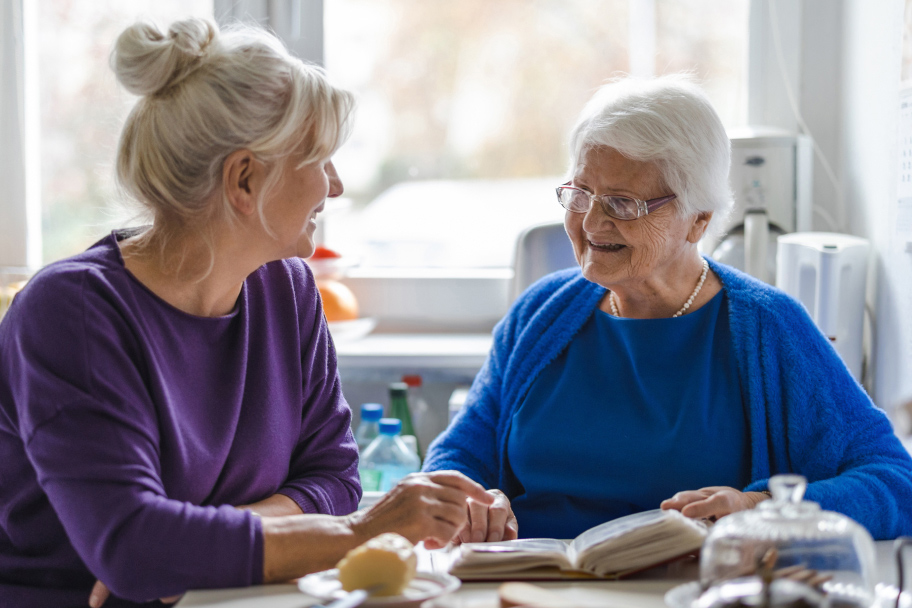A guide to Alzheimer's caregiving

No matter what stage of Alzheimer’s your loved one is facing, caregiving for someone with Alzheimer's comes with unique challenges. It’s important to learn what to expect, how to prepare and where to find help when needed. Read on for an overview of things to think about as a caregiver for someone with Alzheimer’s disease.
What is Alzheimer’s disease?
Alzheimer’s disease is a type of dementia — a general term that describes loss of memory and cognitive abilities. Alzheimer’s disease slowly destroys memory and can interfere with someone’s ability to live independently. Although most people with Alzheimer’s are 65 and older, it is not a normal part of aging.
Alzheimer’s is a progressive disease, which means symptoms worsen over time. Throughout early-, middle- and late-stage Alzheimer’s, the role of the caregiver(s) will look different. What’s most important is making sure to balance taking care of yourself while caring for a loved one.
Creating a safe environment as a caregiver
Safety measures are important for making sure a person with Alzheimer’s can enjoy more freedom to live independently safely. When you’re a caregiver looking at ways to make their home a safer place, keep in mind that you’ll be regularly evaluating and adjusting the space as their disease progresses.
Here are some tips to make a home more Alzheimer-friendly:
- Make sure stairs have at least one handrail. If there isn’t any carpet, install safety grips or mark the edges of steps with brightly colored strips of tape to make them more visible.
- Remove clutter and unused items. This could include small rugs, cords or unnecessary furniture.
- Install safety plugs into electrical outlets, stove knob covers, safety latches on cabinet doors
- Disconnect the garbage disposal and get rid of any toxic plants or decorations that could be a hazard
- Store vitamins, prescription drugs and other over-the-counter medicines into a secured cabinet
- Make sure carbon monoxide and smoke detectors are working properly
- Keep halls and rooms consistently well-lit with extra lights or nightlights
- Be sure guns and weapons are removed from the home or stored in a locked cabinet
- Secure large furniture to prevent tipping
- Install grab bars for the shower, tub and toilet
- Remove or lock up hazardous products, like paint thinner, matches, gasoline and outdoor equipment
Communicating strategies
Since a person with Alzheimer’s will have issues with memory, communication may become increasingly difficult. Sometimes this can make the person become anxious, irritable or even angry. With careful listening and patience, you and the person with dementia can work to better understand each other.
Depending on the stage of Alzheimer's, the person could be having trouble finding the right words, losing their train of thought, reverting to a native language, speaking less often or relying more on gestures or generalized statements.
Here are a few things to keep in mind when communicating with someone with Alzheimer’s:
- Speak slowly, clearly and with simple language
- Listen carefully to their thoughts, feelings and needs, and show that you understand
- Encourage a two-way conversation when possible
- Be patient and don’t interrupt unless they request help
- Maintain eye contact
- Ask one yes or no question at a time
- Avoid arguing
- Give visual cues or provide written notes
- Treat the person with empathy, dignity and respect
Caring for yourself
Taking care of yourself is a vital part of caregiving. It’s easy to neglect yourself when you have so many added responsibilities. Staying strong emotionally, physically and mentally can help you from feeling overwhelmed or burnt out. To help you cope with daily caregiving, remember to:
- Ask for help. Reach out to family members, friends, neighbors or professionals to help share the load.
- Eat healthy foods. This can help keep you healthy and feeling energized.
- Manage stress. Join an online or in-person support group, seek therapy or talk with a doctor.
- Maintain balance. Take breaks each day to do something you enjoy. This could be as simple as a short stroll outside or calling a friend.
- Stay active. Exercise can help relieve stress and prevent illness. Consider yoga, walking, gardening or another activity you enjoy.
- Stay present. Alzheimer’s will change over time and cannot be controlled. Try to accept changes as they come through grieving, focusing on good memories and maintaining a positive mindset.
Resources and support networks for caregivers
| Resource | Description |
|---|---|
|
National Institute on Aging, National Institutes of Health |
Find tips for everyday caregiving, as well as responding to changes in communication and behavior. |
Caregiving of a Person with Alzheimer’s Disease or a Related Dementia Centers for Disease Control and Prevention (CDC) |
Learn more about creating and maintaining a plan when caring for another. |
|
Alzheimer’s Association |
Explore tips and resources for anyone that’s involved in caregiving, decision-making or supporting a loved one with dementia. |